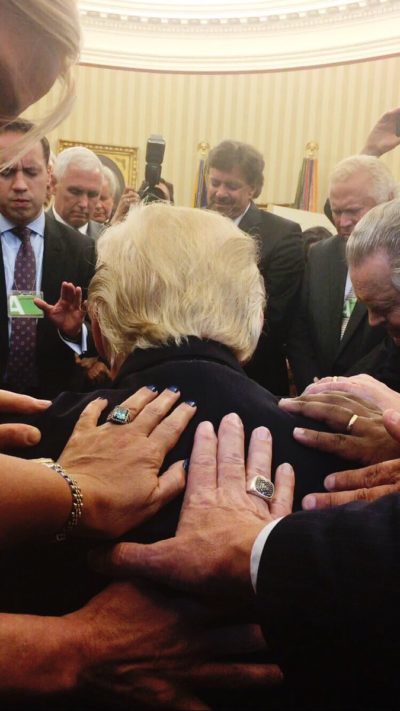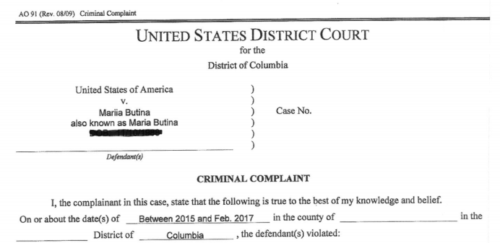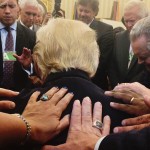Yesterday President Trump’s former lawyer Michael Cohen was sentenced to 3 years in prison for several crimes, including campaign finance violations. In his remarks prior to receiving his sentence, Cohen said he was sorry he helped cover up Donald Trump’s “dirty deeds.”
According to Cohen, Trump directed him to make hush money payments to two women for the purpose of influencing the 2016 presidential campaign. If Cohen (and Dept. of Justice prosecutors) are right, Donald Trump deceived the American people when he told reporters that he didn’t know about the hush money payments. Putting aside the intricacies of campaign finance laws, the evidence is mounting that Trump told the nation a story he knew wasn’t true.
Evangelicals in 1998 and Evangelicals Now
I am old enough to remember when presidential lying about personal moral behavior set off spasms of indignation among evangelicals. In 1998, some of them put pen to paper with an admonishment and solemn call for integrity.* They said the Clinton presidency was in “crisis.” Now, many evangelicals think we are in the best of times. My, how times have changed.
The entire statement is here. Let me bring out a couple of segments which could be written about the current crisis, if only it was seen as one.
We are aware that certain moral qualities are central to the survival of our political system, among which are truthfulness, integrity, respect for the law, respect for the dignity of others, adherence to the constitutional process, and a willingness to avoid the abuse of power. We reject the premise that violations of these ethical standards should be excused so long as a leader remains loyal to a particular political agenda and the nation is blessed by a strong economy. Elected leaders are accountable to the Constitution and to the people who elected them. By his own admission the President has departed from ethical standards by abusing his presidential office, by his ill use of women, and by his knowing manipulation of truth for indefensible ends. We are particularly troubled about the debasing of the language of public discourse with the aim of avoiding responsibility for one’s actions.
Remember this was written by evangelicals in 1998. Now we hear that a good economy and Supreme Court justices trump violations of ethical standards. Evangelicals of 1998 were “troubled about the debasing of the language of public discourse.” Now they join in the debasing.
It appears clear to me that evangelical leaders no longer believe “the moral character of a people is more important than the tenure of a particular politician or the protection of a particular political agenda.”
Neither our students nor we demand perfection. Many of us believe that extreme dangers sometimes require a political leader to engage in morally problematic actions. But we maintain that in general there is a reasonable threshold of behavior beneath which our public leaders should not fall, because the moral character of a people is more important than the tenure of a particular politician or the protection of a particular political agenda. Political and religious history indicate that violations and misunderstandings of such moral issues may have grave consequences. The widespread desire to “get this behind us” does not take seriously enough the nature of transgressions and their social effects.
This statement finds new relevance in the presidency of Donald Trump for reasons which go far beyond hush money payoffs to women. It is absolutely stunning what is now acceptable to evangelical leaders. Current evangelical leaders clearly have flipped this statement. It appears to me that they believe that their political agenda is more important than the “moral character of a people.”
At least that is how it has seemed up to now. I have to wonder: Could the Michael Cohen sentencing and surrounding events be the off-ramp for evangelical leaders? It was also revealed yesterday that the National Enquirer entered into a cooperation agreement with prosecutors regarding the hush money to one of the two women. The effect is that they acknowledged the money was paid to influence the campaign which contradicts Trump’s story. In other words, the magazine sided with Cohen’s version of events. Will evangelicals stick with Trump if it becomes crystal clear to them that he directed felonious violations of the law in contrast to his claims?
*(Declaration concerning religion, ethics, and the crisis in the Clinton presidency. The following declaration can be found at moral-crisis.org, November 16, 1998. To be released on 13 November 1998.)


 regret my former advice and I have written many lines since about 2006 to turn from that bad advice.
regret my former advice and I have written many lines since about 2006 to turn from that bad advice.
 voters reason that Trump will move America toward their vision of a Christian America even if he isn’t personally devout. Once upon a time, Christian leaders told us that character counts in leaders. Now, power is what matters. Trump voters want policies in place which will coerce a Christian consensus — make America Christian again.*
voters reason that Trump will move America toward their vision of a Christian America even if he isn’t personally devout. Once upon a time, Christian leaders told us that character counts in leaders. Now, power is what matters. Trump voters want policies in place which will coerce a Christian consensus — make America Christian again.*